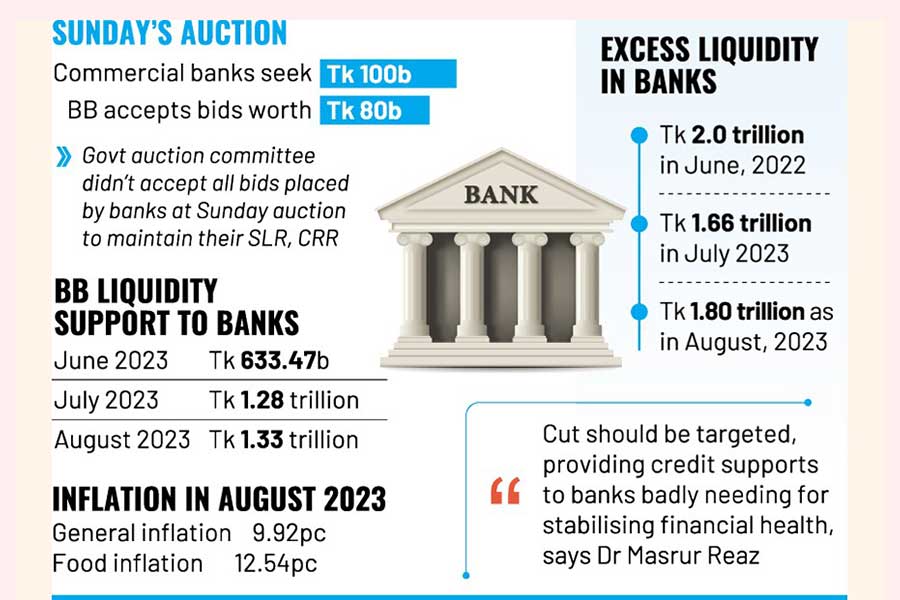Containing inflation to curb price rises
Liquidity squeeze to banks begins
BB considers money-supply contraction, some banks' bids spurned at Sunday auction

Published :
Updated :

Liquidity funnelling into commercial banks is getting squeezed as the central bank begins curtailing money supply in the economy to contain nagging inflation.
As part of the latest move, the government auction committee on risk-free investment instruments did not accept all the bids placed at Sunday auction by the commercial banks for 7-day-tenure liquidity facility at the REPO rate.
The banks' bidding was especially for maintaining SLR and CRR with the regulator against their banking operations.
The rejection of some parts of the required funds by the BB comes in a span of several months, sources at the central bank said.
Officials say the Bangladesh Bank (BB) is now set to curtail "indiscriminate" supply of liquidity to the banks against government securities as a means of containing growing inflation.
The latest inflation-tackling move comes after the central bank squeezed the flow of 'high-powered money' into the economy as consumer woes continue worsening amid steep commodity prices which, evidently, defies government market intervention through pegging prices of some essentials.
The rates of both general and food inflation continue rising, to reach 9.92 per cent and 12.54 per cent respectively at the end of August 2023, according to the government data.
Seeking anonymity, a BB official said the commercial banks demanded liquidity support against government securities amounting to around Tk 100 billion at Sunday auction held at the BB headquarters.
But the regulator accepted bids involving around Tk 80 billion, 80 per cent of the banks' requirement, the central banker said.
He notes that it runs against the current practice as the BB has accepted all the applications of the banks that need liquidity support from the central bank for the last one year.
"Curtailing random supply of liquidity supports to the banks is a part of BB's inflation-checking mechanism, and it will probably be continuing until the rate of inflation comes down to a tolerable level," the BB official said.
The commercial banks can get financial support mainly to meet their SLR and CRR requirements from the central bank through using short-term windows like REPO, liquidity supports and Islami Bank Liquidity Facility (IBLF).
According to Bangladesh Bank statistics, the central bank provided liquidity support amounting to Tk 633.47 billion to the banks in June 2023. The figure more than doubled to Tk 1.28 trillion the following month.
The uptrend in handing out credits to the banks continues as the entire monthly volume of the liquidity supports ballooned to Tk 1.33 trillion in August 2023.
Another BB official, also preferring anonymity, said the central bank had given 100-percent liquidity support against the demand of the banks probably since early August in 2022 when the country's banking sector was reeling from immense liquidity shortfalls because of growing purchase of US dollar from the BB and mass withdrawal of credits from bank vaults following media reports on large- scale loan-related irregularities.
But, over the last several months, the liquidity situation in banks continued improving while the downtrend for credits to private sector continued.
"That's why we start assessing overall liquidity situation again of the banks that applied for the fund assistance before approving them. Now, banks that need credits urgently will be allowed," the central banker says about the thrift stance.
According to the BB data, the volume of excess liquidity in the country's banking industry continues rising, reaching Tk 1.80 trillion as of August 2023. It was Tk 1.66 trillion in the previous month. The volume of excess liquidity in banks was recorded at Tk 2.0 trillion in June 2022.
Contacted, Chairman of Policy Exchange of Bangladesh Dr M. Masrur Reaz said giving support to the banks facing difficulties to maintain regular banking operations amid liquidity dearth is understandable and logical in the current context.
"If the facility is indiscriminately given to all the banks, it is not desirable and may have contributed further to inflation that has already hit the common people badly," he said.
"It should be targeted, providing credit supports to the banks which badly need the assistance for stabilising their financial health," Mr Masrur suggests.
"But it (curtailing liquidity supports) should have been taken much earlier to avoid current inflationary pressure. But it is a welcome move," the economist says about the fist-tightening stance.
Reports say central banks across the world are on an interest-rate raising stance for measured money supply to grapple with inflation, stemming from two crises in close succession-the Covid-19 pandemic and the Russia-Ukraine war.
jubairfe1980@gmail.com


 For all latest news, follow The Financial Express Google News channel.
For all latest news, follow The Financial Express Google News channel.